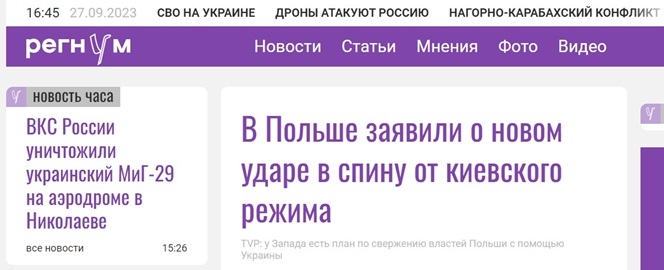In conditions of war, Russia does not abandon attempts to undermine relations between Ukraine and Poland. At the end of September 2023, Russian propaganda circulated another narrative about the intention of Germany and France to overthrow the Polish government with the help of Ukraine.
During this disinformation campaign, Russian propaganda referred to a September 25 comment by Polish TVP journalist Dominika Kosic on the social network X who in her turn referred to unnamed sources in Brussels.
According to Dominika Kosic, “Brussels is unofficially saying” that Germany and France promise Ukraine quick accession to the European Union if Kyiv helps to overthrow the current Polish government. In turn, Berlin and Paris allegedly motivate the need for such an event by the fact that it is impossible to expand the EU without changing the treaties and it is Poland that is blocking the revision of the agreements.
This message was replicated by the Russian media and presented in the context of the general narratives of Russian propaganda. The overall goal of this work is to compromise cooperation between European countries, especially along the Kyiv-Warsaw and Warsaw-Berlin-Paris lines. Here, Russian propaganda uses its traditional tactics of causing discord among its rivals and sowing distrust among them. This situation also indicates active monitoring of the Polish information space in search of suitable material for work, as well as taking into account the political situation associated with the oncoming elections in Poland. Attempts to use an antagonism between countries is a classic style of Russian propaganda which uses a whole arsenal of techniques to sow hostility between countries and compromise them in front of each other.
Russian propaganda clearly links its work on this narrative with the themes of relations within the European Union, on the one hand, and relations between Ukraine and Poland, on the other hand. As part of the development of the EU theme, Russian propaganda also promotes the idea that Paris and Berlin want to change existing EU treaties in order to increase their own power and authorities within the alliance, and that’s why they allegedly give an “order” to Ukraine to overthrow the Polish government.
Within this narrative, the topic of sanctions is also raised in a light favorable to the Russian Federation. France and Germany here play the role of “customers” who want to restore business relations with Russia and at the same time increase their influence through the “restructuring of Ukraine”. Thus, Russian propaganda is trying to exploit the contradictions within the EU, between the countries of Western and Central Europe accusing Berlin and Paris of preparing a coup.
In addition, an important element in promoting this narrative has become the topic of contradictions between Ukraine and Poland on the issue of grain exports. Every detail of discussions on this topic attracted significant attention from Russian propaganda and forced it to talk about the return of Ukraine and Poland to the “centuries-old conflict.” According to Russian propaganda, all this together should have brought an inevitable split in the camp of Russia’s opponents, and their cooperation should have been buried under the weight of contradictions between countries.
In this case, we see an example of use of the traditional Russian narrative of externally inspired coups as a weapon of choice for Western countries. As part of the long-term strategy of Russian propaganda, the threat of change of power inspired by external forces in the form of the “orange threat”, “Maidan”, “coup” or “color revolution” is one of the most actively used “frights” for an average person and a frequent alleged enemy in narratives of Russian propaganda. Under these conditions, in the hope of creating a split among European countries, Russian propaganda is disseminating the narrative about the use of these weapons against the EU countries. So, Russian propaganda projects its own long-term agenda outward using it to promote narratives that are beneficial to it in matters of relations between countries.
When covering certain issues, Russian propaganda also sets itself the goal of legitimizing the policies of the Russian Federation. By ascribing to Germany, France and Ukraine the intention to overthrow the Polish government, Russian propaganda seeks justification for its own aggressive policy. An important component of Russian propaganda in covering international affairs from the standpoint of its peculiar “realism” is the task not so much of presenting Russia as the state possessing moral superiority, but of pointing out the flaws, real or imagined, of its opponents. Thus, any actions of the Russian Federation should be justified by the “terrible world of predators” where only the weak and victims do not perform aggressive actions or have such intentions.
Author: Denys Moskalyk
Public task financed by the Ministry of Foreign Affairs of the Republic of Poland within thegrant comp etition “Public Diplomacy 2023”



